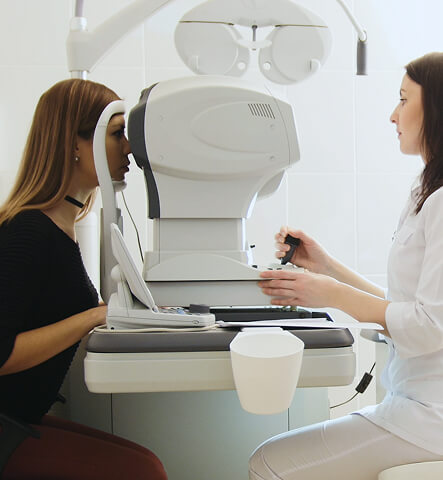We offer advanced eye imaging technologies to provide you with the most comprehensive and accurate eye health care possible. Our optical coherence tomography (OCT) and Optomap services allow us to see detailed images of your eyes, helping to detect problems early and monitor your vision over time.
What is an OCT eye scan?
OCT is a non-invasive imaging test that uses light waves to capture intricate cross-sectional images of your retina – the thin tissue at the back of your eye – and the optic nerve, which sends visual information to the brain. This helps detect subtle changes not visible in a standard eye exam.
An OCT scan typically takes around 15 minutes and is completely painless. During the test, you’ll be asked to focus on a target while the machine takes pictures. There is no contact with your eye and no drops are required.
Who gets an OCT scan?
OCT scans are included in our advanced eye examinations or available separately for an additional fee. While not included in the standard eye exam, we strongly recommend them for patients aged 18 and over, especially if you have risk factors like a family history of eye disease, diabetes or high eye pressure.
Our cutting-edge technology
We’re proud to use state-of-the-art Nidek OCT machines across our branches. These devices enable us to thoroughly assess your optic nerve health and identify subtle signs of glaucoma and other retinal conditions.
Why OCT scans matter
The biggest benefit of OCT scans is that they help detect serious eye conditions like glaucoma, macular degeneration, diabetic retinopathy and optic nerve damage, often before symptoms appear. Because these conditions can develop silently, early diagnosis through OCT allows for timely treatment to protect your vision and reduce the risk of permanent sight loss.
These scans are also invaluable when referring patients to ophthalmologists, providing detailed images to assist specialists in diagnosis and ongoing care.

Optomap retinal exam
In addition to OCT, we offer Optomap retinal imaging, which captures ultra-widefield images of the retina quickly and painlessly. While OCT shows detailed layers, Optomap gives a wide view of the retina’s surface. Together, they provide a more complete picture of your eye health.

 Contact Lenses
Contact Lenses OCT
OCT Myopia Management
Myopia Management Visual Stress
Visual Stress Dry Eye Management
Dry Eye Management Frame Styling Consultations
Frame Styling Consultations